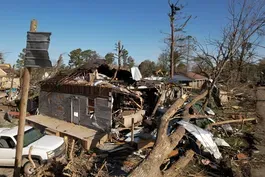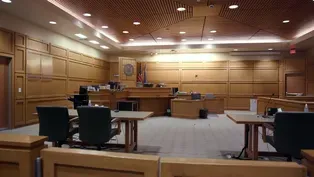
How FDA approval of OTC Narcan affects the opioid crisis
Clip: 4/1/2023 | 6m 48sVideo has Closed Captions
How FDA approval of over-the-counter Narcan sales affects the opioid crisis
This week, the FDA approved nationwide over-the-counter sales of Narcan, the brand name version of the generic overdose reversal drug naloxone. Overdoses are the leading cause of accidental death in the U.S., driven in large part by opioid use. Dr. Andrew Kolodny, co-director of opioid policy research at the Heller School at Brandeis University, joins John Yang to discuss.
Problems with Closed Captions? Closed Captioning Feedback
Problems with Closed Captions? Closed Captioning Feedback
Major corporate funding for the PBS News Hour is provided by BDO, BNSF, Consumer Cellular, American Cruise Lines, and Raymond James. Funding for the PBS NewsHour Weekend is provided by...

How FDA approval of OTC Narcan affects the opioid crisis
Clip: 4/1/2023 | 6m 48sVideo has Closed Captions
This week, the FDA approved nationwide over-the-counter sales of Narcan, the brand name version of the generic overdose reversal drug naloxone. Overdoses are the leading cause of accidental death in the U.S., driven in large part by opioid use. Dr. Andrew Kolodny, co-director of opioid policy research at the Heller School at Brandeis University, joins John Yang to discuss.
Problems with Closed Captions? Closed Captioning Feedback
How to Watch PBS News Hour
PBS News Hour is available to stream on pbs.org and the free PBS App, available on iPhone, Apple TV, Android TV, Android smartphones, Amazon Fire TV, Amazon Fire Tablet, Roku, Samsung Smart TV, and Vizio.
Providing Support for PBS.org
Learn Moreabout PBS online sponsorshipJOHN YANG: This week, the FDA approved nationwide over the counter sales of the overdose reversal drug Narcan.
Narcan is the brand name version of the generic drug Naloxone, which comes as either a nasal spray or injection.
Overdoses are the leading cause of accidental death in the United States responsible for more than 932,000 fatalities since 1999.
And today, it's largely driven by opioid use.
Earlier I spoke with Dr. Andrew Kolodny, Co-Director of Opioid Policy Research at the Heller School at Brandeis University.
DR. ANDREW KOLODNY, Medical Director, Opioid Policy Research Collaborative: I think that the decision to allow Naloxone to be sold over the counter is helpful.
It will make an antidote to opioid overdoses, more available, which is an important thing to do when opioid overdoses become the leading cause of accidental death in the United States.
So I do think that overall this is a positive change.
But many people who die of an opioid overdose do so without an opportunity to be rescued.
And for the people we do rescue with Naloxone.
Most of them are suffering from opioid use disorder if we don't see that they get treatment for their opioid use disorder.
It just have to hope someone's around with Naloxone the next time they overdose.
And Naloxone is helpful, but it's likely to have a small impact.
JOHN YANG: And what do you think would be a have a bigger impact?
DR. ANDREW KOLODNY: We should be doing a better job of both preventing opioid use disorder, and especially in treating opioid use disorder.
If we want to see overdose deaths come down in the short run, we really have to see that accessing effective outpatient treatment particularly with a medicine called buprenorphine, the first line treatment for opioid use disorder, we have to see that that treatment is made much easier for people to obtain, it has to essentially be free.
And if we can make this -- that treatment more valuable, while making it harder for people to continue using fentanyl or heroin or prescription opioids, I think we'd start to see overdose deaths come down significantly.
JOHN YANG: Is the cost of it, our hurdle, yes, it may be more freely available, you may be able to buy it in more places.
But is the price prohibitive?
DR. ANDREW KOLODNY: At the moment there are many community organizations that give out Naloxone for free.
There are states that sponsor programs they are grants that pay for free naloxone.
And all of that has been very helpful, this new product that's going to be released over the counter.
Unfortunately, it does appear as though the manufacturer is going to be charging a very hefty price for the drug.
And that does not seem appropriate.
It looks like the manufacturer is trying to take advantage of the desperate situation we are, we're in in the United States.
JOHN YANG: And how easy is it to use?
DR. ANDREW KOLODNY: Administering Naloxone to someone who's experiencing an overdose is easy.
That doesn't mean that there isn't anything people should know if they're responding to an opioid overdose.
For example, we should tell people that don't just give Naloxone but also immediately call 911.
We should let people know that Naloxone can wear off faster than the opioid that caused the overdose.
And if that happens the patient can stop breathing again and we'll need another dose of Naloxone.
And something we've even seen happening in different parts of the country is we've seen community groups teaching children, how to administer Naloxone to their parents, when they witness an overdose.
So if it's something we can teach children to do, I think that speaks to how straightforward it really is.
JOHN YANG: And what advice would you give people?
Is this something that should be in everyone's first aid kit in their medicine cabinet?
Do you -- would you like to see as many people as possible to be carrying this?
DR. ANDREW KOLODNY: So Naloxone should be available any place where there's a chance somebody can experience an opioid overdose.
So in households where individuals are taking opioid pain medication, even prescribed pain medication are households where someone in the family has opioid use disorder, those are homes that should have naloxone.
But we should also have naloxone in public places.
We should have naloxone in Starbucks because people are overdosing and bathrooms.
We should have it on airplanes, we should really have it very widely available, considering how common it is in America for people to lose their life to an opioid overdose.
JOHN YANG: I presume you want to see this treated as a disease rather than punished as a crime?
DR. ANDREW KOLODNY: That's correct.
And I think one of the things that we've seen over the past 15 years is a greater awareness that people with opioid use disorder are in fact, suffering from a disease or chronic disease rather than a moral failing.
But we haven't yet put that into action.
We haven't really seen a commitment from the federal government to long term funding for opioid addiction treatment.
During the AIDS crisis, for example, there -- the United States decided that if someone was HIV positive, they should have access to antiretroviral therapy, regardless of their ability to pay for it and we created a new funding stream.
We haven't yet done that for opioid addiction.
JOHN YANG: And do you think the administration should be doing more?
DR. ANDREW KOLODNY: So I think that there is a lot more that the FDA and the Biden administration could be doing.
The FDA could be doing a much better job of helping prevent opioid use disorder from better regulation of opioid manufacturers to this day, the FDA is allowing manufacturers of opioid products to promote opioids as safe and effective for conditions where they may not be safe or effective changes that needed to be made for many years.
It would be nice to see the FDA act on them.
The Biden administration could be doing a much better job of expanding access to opioid addiction treatment.
When President Biden ran for office in his platform he had a very nice, detailed plan for making opioid addiction treatment more valuable in the United States.
And yet, we really haven't seen the administration fully act on that plan yet.
JOHN YANG: Dr. Andrew Kolodny, the Opioid Policy Research collaborative at Brandeis University, thank you very much.
DR. ANDREW KOLODNY: Thank you for having me.
Deadly storms, tornadoes lay waste to South and Midwest
Video has Closed Captions
Clip: 4/1/2023 | 7m 26s | Deadly storms, tornadoes lay waste to large areas of South and Midwest (7m 26s)
The impact of the attorney shortage in Wisconsin’s courts
Video has Closed Captions
Clip: 4/1/2023 | 6m 51s | The legal impact of Wisconsin’s shortage of prosecutors and public defenders (6m 51s)
Providing Support for PBS.org
Learn Moreabout PBS online sponsorshipSupport for PBS provided by:
Major corporate funding for the PBS News Hour is provided by BDO, BNSF, Consumer Cellular, American Cruise Lines, and Raymond James. Funding for the PBS NewsHour Weekend is provided by...












